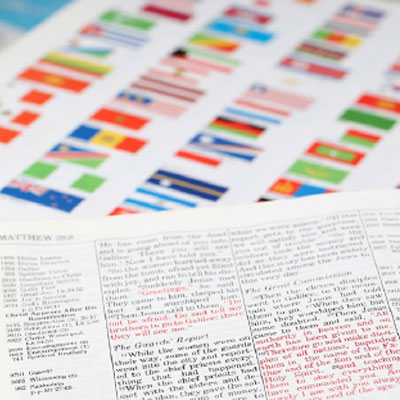In 1861, the Rev James Adderley was a British member of Parliament. His prayer for ‘national confession’ included the line, ‘We are truly sorry for all the past sins of this nation. We contemplate in deepest contrition the sins of which we are now guilty’.
Australian Prime Minister, Tony Abbot, recently attacked the state-funded broadcaster, ABC, for its coverage of allegations that Australia had been spying on the Indonesian Prime Minister. Abbot complained that the ABC ‘instinctively takes everyone’s side but Australia’s . . . you should not leap to be critical of your own country’. Journalists were left wondering whether their primary loyalty was to accurate reporting of the truth or to the national interest.
The contrast could not be more apparent.
Nationalism dilemma
It is a dilemma that goes to the heart of the current global rising tide of nationalisms and patriotisms. Ulrich Beck describes global trends of this type as ‘stowaways’, popping up everywhere and anywhere, when least expected. They frequently cause headaches for Christian leaders and pose particular challenges for the church or mission agency leader responsible for managing multi-national teams. This simple observation requires us to understand the scope and significance of nationalism in the context of global mission.
European nationalist surge
The global region that the author knows best, Europe, currently faces the challenges of nationalist parties winning votes in regional, national, and European elections by exploiting popular concerns about immigrants, Muslims, or historical minority groups:
- Netherlands: The anti-Islamic Party for Freedom (PVV) won 24 seats out of 150 in the 2010 general elections, and until 2012, was a key ally of the minority government. It currently has 4 out of 25 Dutch members of the European Parliament (MEPs).
- Hungary: Jobbik, established in 2002, has 43 MPs out of 386 and 2 MEPs, making it the third largest party in Hungary. Committed to the protection of Hungarian values and interests, it describes itself, among other things, as a ‘radically patriotic Christian party’. Commentators describe it as ‘anti-Semitic’ and ‘neo-Nazi’.
- Italy: The Northern League (Lega Nord) is a separatist and nationalist party that performs strongly in northern Italy. It has 41 elected politicians at various levels of national government and, in 2010, controlled 14 provinces. It currently has 9 out of 73 Italian MEPs.
- France: The National Front (FN) party, founded in 1972, polled 20% of the vote in local elections in 2010. It has 3 MEPs and 2 members of the National Council. It frequently invokes the memory of Joan of Arc as a unifier of French values and interests.
- United Kingdom: The British National Party (BNP), founded in 1982, now has two local councillors and 1 MEP. With the rise of the UK Independence Party (UKIP), a less extreme form of nationalist politics has proven popular. It has 9 British MEPs and 220 local councillors.
- Greece: The Popular Orthodox Rally (LAOS), founded in 2000, has 2 MEPs and controls 121 local councils. LAOS claims an Orthodox Christian religious identity allied with a radically nationalist political identity.
- Denmark: Since 2001, the nationalist, left-of-centre Danish People’s Party (DF) has pursued policies committed to protecting the cultural heritage of Denmark, including the monarchy and the Church of Denmark. Through its 22 MPs, one MEP, and 186 local councillors, it resists the promotion of Denmark as a multi-ethnic society and works to limit immigration and promote the cultural assimilation of migrants.
Nationalist parties from Central Europe have tended to target historical minorities and generally espouse pro-Fascist ideologies, originating in the 1930s. Western European versions tend to target multi-culturalism, immigration, and Muslims in particular.
While populist parties stir up fears, the churches often struggle to express a clear kingdom perspective. While Pope Benedict XVI frequently referred to this as a spiritual crisis of values, there is no united evangelical voice speaking into the economic and political instability. In some instances, the churches find themselves, wittingly or unwittingly, portrayed as patriotic allies in the struggle to stem the influx of non-Christian immigrants.
A round-up of stories in 2013 from the BBC, the New York Times, Le Monde, the British Guardian, and Australian newspaper The Age, make reference to instances of nationalism in 35 countries and territories around the world.
How are we to think about nationalism?
Early in his own critique of nationalism, Charles Taylor[1] concludes that nationalists, above all else, issue a ‘call to difference in the face of homogenizing forces’ that are global in nature and which assume that the nation-state is deeply implicated in the global market economy. Gerard Delanty[2] argues that the success of nationalism lies in its capacity to imagine forms of community that nurture national belonging, intimacy, commonality, independence, and self-determination—those things that are perceived to have been destroyed by nation-states, undermined by political parties, and weakened, we may add, by global bureaucracies.
Global bureaucracies are commonly rooted in forms of trans-sovereignty that embrace the emergence of increasingly efficient trans-national markets and forms of co-operation (including the European Union). Eurosceptic reactions to the EU are typically directed at its bureaucracies—shaped by the legal and treaty framework underpinning its shared political, economic, and cultural life. It is precisely during the period culminating in the signing of the Maastricht treaty in 1992 that many of the far-right and nationalist parties in Europe were founded.
In resisting globalisation, most nationalisms use alternative narratives that are mythological. These can include:
- ‘Frontier’ myths (common, for example, in the USA);
- ‘Sacred origin’ myths (such as the primordialist Magyar myths of the far-right parties in Hungary);
- ‘Heroic’ myths (such as the ANZAC mythology that is so important to contemporary Australian identity);
- ‘Creation’ myths (common among the indigenous peoples of the world); and
- Myths of ‘Manifest Destiny’ (including, though not limited to, the USA).
Of course, writing in this way will offend some in countries where these myths are credited with greater historical veracity than this article may appear to concede. This fact alone illustrates the power of myths—their capacity for mobilising public opinion, galvanising action, and ultimately motivating nations to collective action.
What are the issues for evangelical leaders?
Firstly, The Lausanne Movement is clearly a global expression of evangelical Christianity, and consequently exhibits some characteristics of other global movements. Lausanne’s commitment to a vision of the one worldwide body of Christ, fuelled by passion and enthusiasm, is entirely appropriate and wholly commensurate with a vision of the kingdom of God. Yet, The Lausanne Movement has to balance constantly the national interests and agendas of evangelical groupings with the global agendas urged upon it by the movement’s leaders.
Secondly, mission teams currently located in various parts of the world will, for example, have Russian and Ukrainian members. Certainly, Russians and Ukrainians will share some common sympathies regarding the current situation in Ukraine, mostly rooted in a broader vision of the kingdom of God. However, in such situations the wise team leader prepares for heated discussions within the team as fault-lines converge around patriotic or nationalistic feelings:
- These will be conveyed in the sense, felt by both sides, that my country normally gets it right, deserves my support, and my country’s media are probably more accurately telling me the truth.
- The journey from patriotism to nationalism starts when ‘my’ convictions become absolute, and loyalty to country demands a refusal to question it and efforts to silence the questions of others.
Thirdly, as another example, the bitter dispute between China and Japan, focused on several small islands, threatened to derail an English-language class the author was teaching to students in China in 2013. A loaded question from the student monitor was only defused when the author said that such issues were not widely reported in other countries! The vital national interests of any one country may be rarely reported by the media of other countries; yet it is necessary for the astute cross-cultural Christian worker to be constantly alert to the spectre of nationalism raising its ugly head and threatening to undermine credible witness.
Of course, the curse of nationalism for the faithful follower of Jesus Christ is seen in the extent to which Christianity is mobilised as a unifying source of national identity over and against others. Responsible and astute media commentators will recognise that impact of religion on public and political conversation. Without this recognition, it is difficult to form an intelligent view of the current crisis in Ukraine, for example. The arrival of Orthodox Christianity in Kiev and the ‘Baptism of the Rus’ in 988AD are central to Ukrainian and Russian versions of national identity and continue to play out in the current crisis there.
A biblical perspective
Evangelicals may choose on occasion to express solidarity with their government, and it is not always wrong to do so. However, they are well advised to keep in mind the counsel of British theologian, Esther Reed:
It is not possible to work with an account of . . . nation and nationhood . . . if this means a moral partiality or politics of superiority that would deny to others the same human rights as those of its members, is marked by hostility towards and suspicion of other nations, and condones the violence and destruction that results from these attitudes.[3]
This perspective reflects a biblical theology of the nations that portrays them as the pinnacle of God’s creative acts (Gen 10:32); laments their incredible hubris (Gen 11:4); declares them to be at the centre of God’s missionary purposes (Gen 12:2-3); gathers all nations into the body of Christ (Rev 7:9); yet still concludes with an eschatological picture of the nations in submission and under judgement (Rev 19:15). Christian identity and allegiance can only ever be to Christ. All other forms of loyalty are temporal and will pass away, finally exposed as worthless by the Judge of every tribe and every nation.
Suggested responses
We need firstly to repent of any partiality or superiority that we instinctively feel or demonstrate toward co-workers or those among whom we work.
Secondly, we need to work hard at identifying potential sources of nationalist tensions within our own ministry and mission teams. We should be prepared to address tricky issues that may arise from time to time, prompted by geo-political developments. It is better sensitively to raise these issues within a team and try to handle them in a healthy manner, always striving for the reconciliation secured by Christ through his death and resurrection. The alternative can be a festering resentment.
Thirdly, we should be prepared to offer training to teams sent into areas where they are likely to encounter nationalist tensions. Jesus faced this in his own ministry and responded to a leading question, ‘Is it right to pay taxes to Caesar?’ with clarity, wisdom, and grace. Our equivalent advice might be to focus training around the notion of ‘Give to your nation the loyalty due to it and to God the loyalty due to him’. Christians, however, need constant reminding that loyalty to God is always prior to loyalty to nation. This fact may, at times, require us carefully to re-evaluate how much any country can ultimately expect of a disciple of Jesus, the Lord of Lords.
Endnotes
- Charles Taylor, ’Nationalism and Modernity’ in Robert McKim and Geoff McMahan, eds, The Morality of Nationalism (Oxford: Oxford University Press, 1997), p 51.
- Gerard Delanty, Community, 2nd Edition (Abingdon, UK: Routledge, 2009), p 151.
- Esther Reed, Theology for International Law (London: Bloomsbury Publishing, 2013), p 220.

